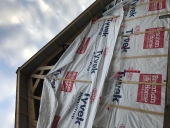

Burl Smith wrote:Yes, thanks. I can see that there isn't much in the way of inflorescence to divert energy away from root production, but maybe they can produce longer if the flowering cycle is interrupted. I'll have to compare them with others untampered with in the same row.

Damien Vallero wrote:@alderburns
Thanks for the suggestion. The corners are staked pretty well as is. I hopped inside and braced the corners with some hefty boards running from top plate to bottom plate. Some folks we've spoken to seem to think it's not actually much of a problem and that it can be resolved by some trimming and pulling and further bracing if needed.

Debi Baker wrote:Biodegradable still may not be good for plants, it may have too much salts. People do it anyways, if you do be sure to spread out where it goes and irrigate with other water there too. Can depend on how large your household is if it is too much for your plants. In a mediteranian climate this will be more of an issue in the summer when there is no rain to dilute it in the soil. All the homemade laundry soap recipes have borax, for example, which is not good for plants, so it would have to be not too much of it.
There is only one brand that I know if that breaks down into plant FOOD, so it is good for the plants, and that is Oasis . https://www.amazon.com/Oasis-Biocompatible-Laundry-Detergent/dp/B076ZZPSM9/ref=pd_sbs_121_1/132-7733600-3436508?_encoding=UTF8&pd_rd_i=B076ZZPSM9&pd_rd_r=d7e4cf6c-7a80-11e9-a69b-37a3210f4837&pd_rd_w=v31sr&pd_rd_wg=xqKA8&pf_rd_p=588939de-d3f8-42f1-a3d8-d556eae5797d&pf_rd_r=QD4CXWB3QC2SAG1YB60D&psc=1&refRID=QD4CXWB3QC2SAG1YB60D
Dr. Bronners liquid soap is better than most other alternatives, and it is good for some washing, not so good for clothes washing ( may leave residue, but maybe that wont bother you )
The brand Ecos if you cant find the others ( Oasis or Bio_pac) https://www.rootsimple.com/2014/02/what-laundry-detergent-should-i-use-for-greywater-applications/
According to State of California Department of Water Resource’s Graywater Guide: Using Graywater in Your Landscape [2], specific ingredients to avoid include:
-chlorine or bleach
-peroxygen
-sodium perborate
-sodium trypochlorite
-boron
-borax
-petroleum distillate
-alkylbenzene
-“whiteners”
-“softeners”
-“enzymatic” components
